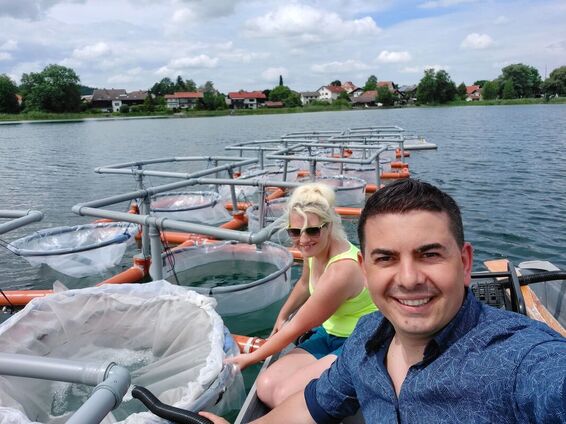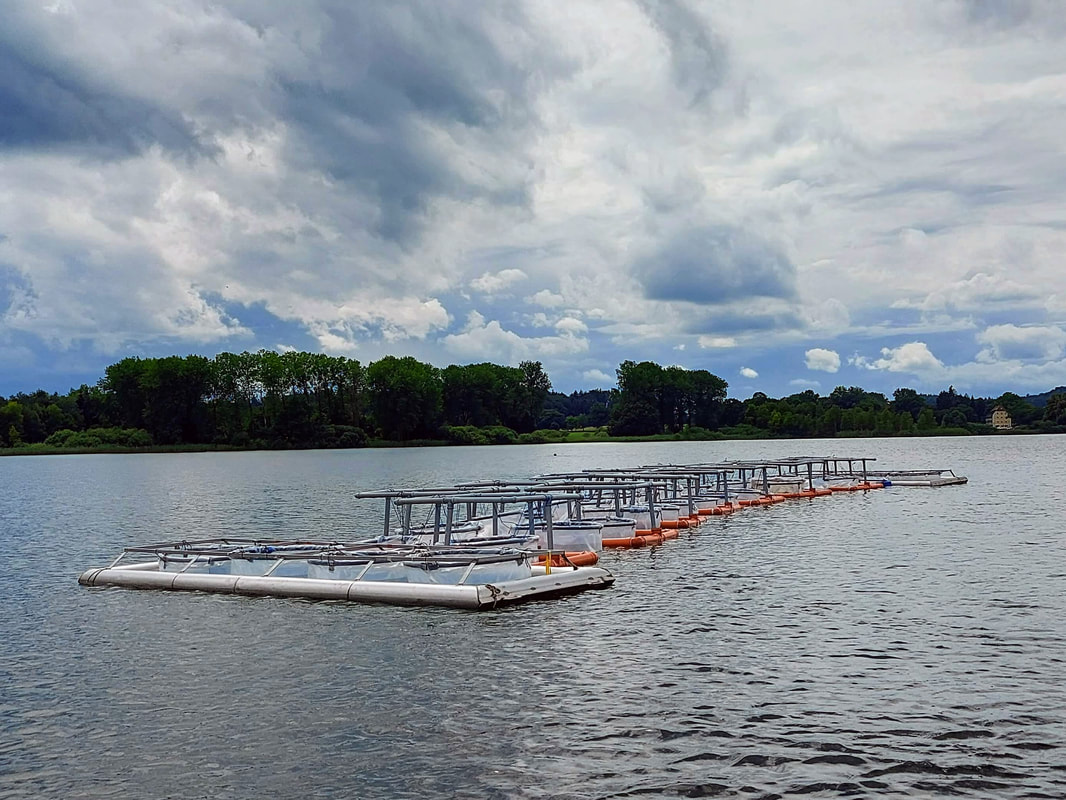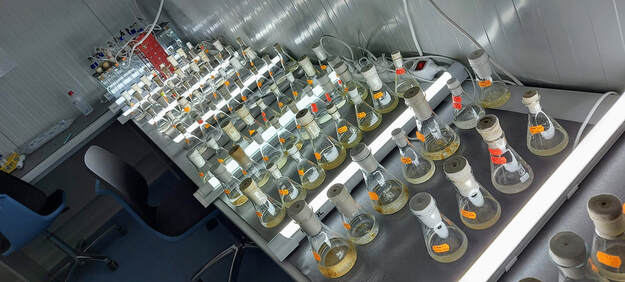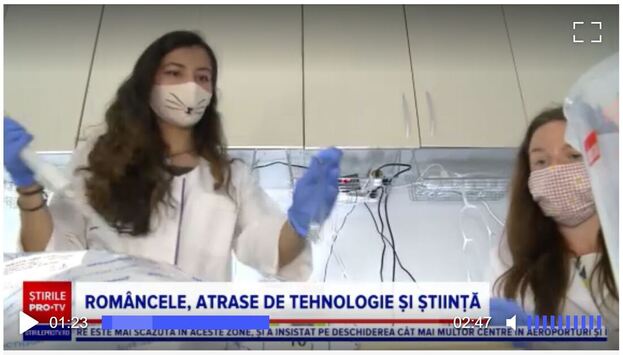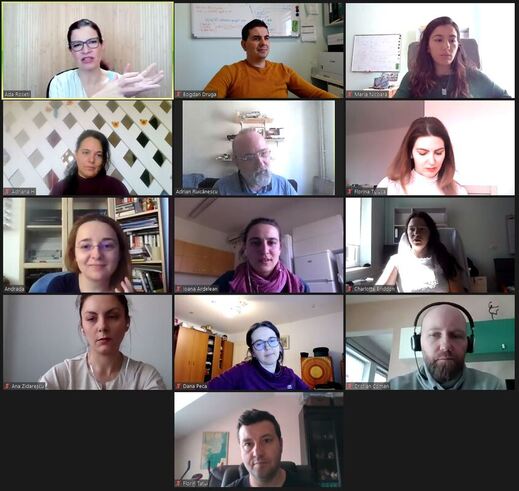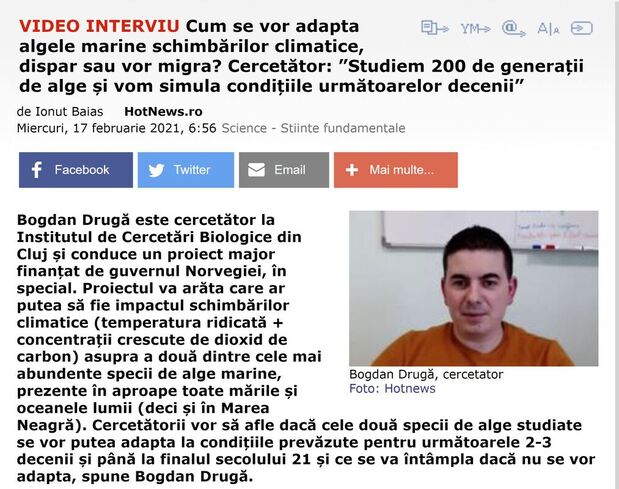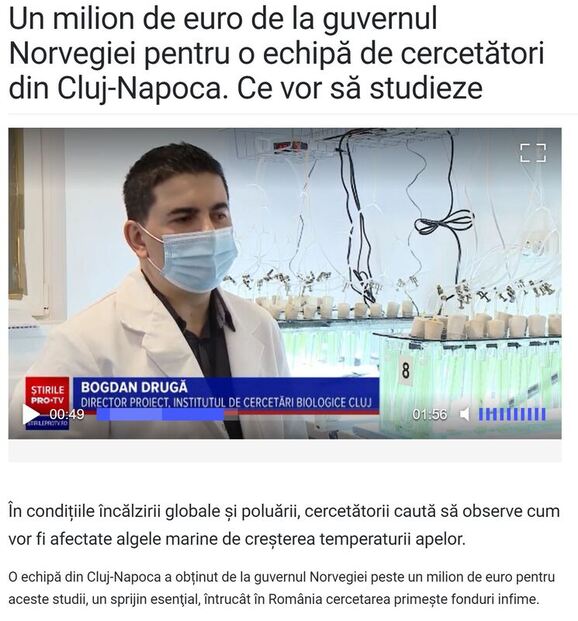|
News.
Keep up with our latest results! |
2022 SUMMARY
Seawater samples from the entire Norwegian coast from the Barents Sea in the North to the Skagerrak in the south covering 5 out of 6 Norwegian eco-regions were collected, resulting in unialgal cultures of Emiliania huxleyi and Skeletonema marinoi being isolated. These were used for experiments in WP2 and WP3 during the summer of 2023.
According to the results of the short-term plasticity experiments (T2.3), we decided to complete the long-term adaptation on six microalgal strains at five temperatures: 7°C, 10°C, 13°C, 16°C and 19°C. Following the provisional projections meant to guide the long-term experiments (WP4), we decided to adapt the strains to three CO2 concentrations: 400ppm (present-day values), 600 ppm (year 2050-2060) and 1000 ppm (predicted CO2 values for the end of the century). The adaptation experiments began in Month 12 (for temperature) and Month 15 (for CO2) for four strains of Skeletonema and two strains of Emiliania (Figure 2.1). The samples were diluted monthly and reinoculated to continue the adaptation experiments, with the remaining biomass collected and stored in the freezer for subsequent analysis. These adapted samples were used in WP3 for the mesocosm experiment.
The 6-day mesocosm experiment was carried out in July 2022 in Kristineberg, Sweden. As a consequence of the results from WP2 and logistical reasons, we only used two Skeletonema strains adapted to 7°C, 13°C and 19°C and all three CO2 concentrations in the mesocosm experiment (Figure 3.1A). These samples were analysed in triplicate (using dialysis bags; Figure 3.1B) and tested in three CO2 treatments (the same as the adaptation conditions) to see whether previous adaptation resulted in a competitive advantage. Every two days, an aliquot of sample from each dialysis bag was collected and analysed for chlorophyll a (using a PHYTO-PAM-II) to determine the abundance of the major algal groups. The resulting data was analysed using analysis of variance (ANOVA). At the end of the experiment, all liquid in the dialysis bags was centrifuged down to remove the excess liquid and the resulting leftover biomass underwent DNA extraction for T3.3.
According to the results of the short-term plasticity experiments (T2.3), we decided to complete the long-term adaptation on six microalgal strains at five temperatures: 7°C, 10°C, 13°C, 16°C and 19°C. Following the provisional projections meant to guide the long-term experiments (WP4), we decided to adapt the strains to three CO2 concentrations: 400ppm (present-day values), 600 ppm (year 2050-2060) and 1000 ppm (predicted CO2 values for the end of the century). The adaptation experiments began in Month 12 (for temperature) and Month 15 (for CO2) for four strains of Skeletonema and two strains of Emiliania (Figure 2.1). The samples were diluted monthly and reinoculated to continue the adaptation experiments, with the remaining biomass collected and stored in the freezer for subsequent analysis. These adapted samples were used in WP3 for the mesocosm experiment.
The 6-day mesocosm experiment was carried out in July 2022 in Kristineberg, Sweden. As a consequence of the results from WP2 and logistical reasons, we only used two Skeletonema strains adapted to 7°C, 13°C and 19°C and all three CO2 concentrations in the mesocosm experiment (Figure 3.1A). These samples were analysed in triplicate (using dialysis bags; Figure 3.1B) and tested in three CO2 treatments (the same as the adaptation conditions) to see whether previous adaptation resulted in a competitive advantage. Every two days, an aliquot of sample from each dialysis bag was collected and analysed for chlorophyll a (using a PHYTO-PAM-II) to determine the abundance of the major algal groups. The resulting data was analysed using analysis of variance (ANOVA). At the end of the experiment, all liquid in the dialysis bags was centrifuged down to remove the excess liquid and the resulting leftover biomass underwent DNA extraction for T3.3.
2020-2021 SUMMARY
Climate change is seriously affecting marine ecosystems, because of ocean warming and acidification. Among other challenges, these changes strongly influence phytoplankton, which represents the base of the food chain and promote ocean services such as ocean production, fisheries, oxygen and carbon cycling. Predicting changes to these services requires an improved understanding of how phytoplankton will react to the changes in habitat, through changing physiological and ecosystem stressors/drivers.
These challenges were addressed by doing a series of long-term adaptation experiment with two of the most abundant marine microalgae: Emiliania huxleyi and Skeletonema marinoi. This was done in order to achieve the main goal of the project: understanding how might climate change impact on overall marine plankton diversity, and how could that impact on human society.
The project started with several field trips done by P1, in order to sample the seawater in various locations on the western coast of Norway. These samples were shipped to Romania, where the CO isolated several strains of Emiliania sp. and Skeletonema sp. After the molecular taxonomic validation of the strain, six of them were selected for the main experiments. The plasticity of all strains was first assessed, by growing them at a wide range of temperatures. Then the long-term adaptation experiment started, with all strains being grown, for 12 months, at five temperatures and three CO2 concentrations, according to the predictions for the coming decades. P1 has provided the predictions for running these long-term tests. A wide range of stakeholders/beneficiaries were consulted over which ocean services they consider important. These beneficiaries included local and national managers and regulators, fishermen, aquaculture actors. Furthermore, the project results were disseminated by both CO and P1 via a large selection of media, from scientific publications, to TV/Internet appearances and social media channels.
These challenges were addressed by doing a series of long-term adaptation experiment with two of the most abundant marine microalgae: Emiliania huxleyi and Skeletonema marinoi. This was done in order to achieve the main goal of the project: understanding how might climate change impact on overall marine plankton diversity, and how could that impact on human society.
The project started with several field trips done by P1, in order to sample the seawater in various locations on the western coast of Norway. These samples were shipped to Romania, where the CO isolated several strains of Emiliania sp. and Skeletonema sp. After the molecular taxonomic validation of the strain, six of them were selected for the main experiments. The plasticity of all strains was first assessed, by growing them at a wide range of temperatures. Then the long-term adaptation experiment started, with all strains being grown, for 12 months, at five temperatures and three CO2 concentrations, according to the predictions for the coming decades. P1 has provided the predictions for running these long-term tests. A wide range of stakeholders/beneficiaries were consulted over which ocean services they consider important. These beneficiaries included local and national managers and regulators, fishermen, aquaculture actors. Furthermore, the project results were disseminated by both CO and P1 via a large selection of media, from scientific publications, to TV/Internet appearances and social media channels.
JULY 2021
Mesocosm training at the Seeon Limnological Station of LMU Munich, Germany
In July 2021, three of the ADVANCE project members (Dr. Bogdan Drugă, Dr. Charlotte Briddon and Maria Nicoară) travelled to Bavaria, Germany, where they got involved in a series of experiments involving both land- and lake-based mesocosms. All these activities were done at the Seeon Limnological Station of the Ludwig Maximilian University of Munich, Germany, under the supervision of Dr. Maria Stockenreiter.
The purpose of this trip was to increase the working skills of the project team in setting up and handling mecocosm experiments, skills that will be used in the ADVANCE project, mainly in the community tests that are planned for the summer of 2022, in Bergen, Norway.
The purpose of this trip was to increase the working skills of the project team in setting up and handling mecocosm experiments, skills that will be used in the ADVANCE project, mainly in the community tests that are planned for the summer of 2022, in Bergen, Norway.
See more picture in our Gallery section.
JUNE 2021
Isolating/growing microalgae from the Norwegian Sea
With the help of our project partners from NIVA, several strains of Emiliania huxleyi and Skeletonema marinoi have been isolated so far. As for June 2021, there are over 30 strains (each in several replicates) that are being grown at ICB Cluj. In July 2021, the adaptation process of some of these microalgae at a range of temperatures and CO2 concentration will start, in Cluj, Romania. This adaptation experiment will last 12 months, after which the adapted algae will be inoculated back into their into natural environment (marine water - in Norway), in order to check their impact on the planktonic communities.
MAY 2021
TV interview - ProTV
Project members Dr. Charlotte Briddon and Maria Nicoară gave a short interview for ProTV, Romania, talking about the role of women in science. The full interview can be accessed here.
APRIL 2021
Science communication workshop
On March 25-26, 2021, an online workshop was organized by the ADVANCE team, with the purpose of increasing the visibility of the project, by training its members on how to be more efficient in disseminating scientific information to the general public, and how to engage stakeholders. Project members participated, along with other researchers and HR specialists who expressed their interest in this event.
The host of this workshop was Ms. Ada Roseti, a former journalist who is currently interested in bringing together the scientists with their results, on one hand, and authorities, stakeholders and the general public, on the other hand. The participants also had the chance to learn how to improve their communication skills from Ms. Andrada Fiscutean, a science journalist who was recently one of the few recipients of an MIT grant focused on science communication.
The host of this workshop was Ms. Ada Roseti, a former journalist who is currently interested in bringing together the scientists with their results, on one hand, and authorities, stakeholders and the general public, on the other hand. The participants also had the chance to learn how to improve their communication skills from Ms. Andrada Fiscutean, a science journalist who was recently one of the few recipients of an MIT grant focused on science communication.
MARCH 2021
TV interview - DIGI 24
Dr. Bogdan Drugă discussed the goal and implications of the ADVANCE project at DIGI 24, Romania. See the interview below:
FEBRUARY 2021
Video interview - HotNews
In February 2021, Dr. Bogdan Drugă was invited to give a video interview for HotNews, Romania, to present the ADVANCE project, and also to talk about the scientific funding in Romania. The interview can be accessed here.
FEBRUARY 2021
TV interview - ProTV
In February 2021, the ADVANCE team from Cluj was invited to give a video interview for ProTV, Romania, to present the goals of the ADVANCE project. The interview can be accessed here.
DECEMBER 2020
The ADVANCE team has been growing!
Our project had two vacant positions dedicated to promising early career scientists willing to join the ICB Cluj team. We got 40 applications from 16 countries. 8 people were invited to online interviews, and two of them were invited to join the ADVANCE team: Dr. Charlotte Briddon and Maria Nicoară.
Charlotte Briddon is a young researcher who successfully defended her PhD thesis (University of Nottingham, UK) in November 2020. She is an expert in paleolimnology, having studied the impact of aquaculture on lake ecology in the Philippines. Charlotte is proficient in multivariate statistics, thus having various computational skills (R, Canoco, CAP, ArcGIS etc). In the ADVANCE project, she will assist with all microalgae growth experiments, and she will be also involved in most statistics / computer modelling-related activities.
Maria Nicoară is currently a Master's student at the Babeș-Bolyai University, Cluj-Napoca, Romania. She has skills in performing microalgae experiments, as well as in general molecular biology techniques. Her tasks in the ADVANCE project will be to co-supervise the long-term adaptation experiments with microalgae, and to run data analyses based on various growth parameters.
Charlotte Briddon is a young researcher who successfully defended her PhD thesis (University of Nottingham, UK) in November 2020. She is an expert in paleolimnology, having studied the impact of aquaculture on lake ecology in the Philippines. Charlotte is proficient in multivariate statistics, thus having various computational skills (R, Canoco, CAP, ArcGIS etc). In the ADVANCE project, she will assist with all microalgae growth experiments, and she will be also involved in most statistics / computer modelling-related activities.
Maria Nicoară is currently a Master's student at the Babeș-Bolyai University, Cluj-Napoca, Romania. She has skills in performing microalgae experiments, as well as in general molecular biology techniques. Her tasks in the ADVANCE project will be to co-supervise the long-term adaptation experiments with microalgae, and to run data analyses based on various growth parameters.
